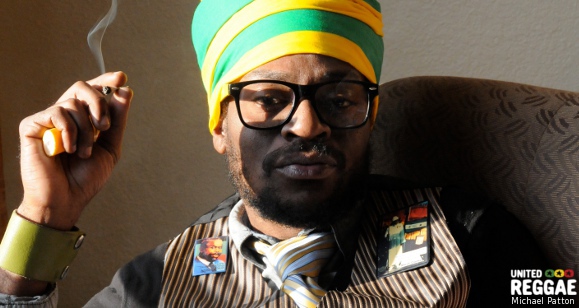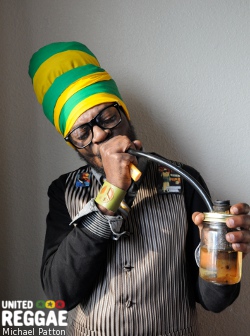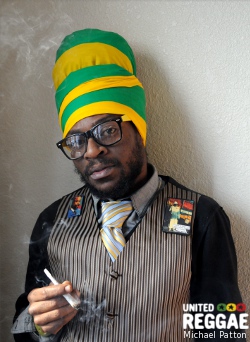Articles about reggae music, reviews, interviews, reports and more...
Interview: Perfect (2011)
- Home
- Articles
- Interviews
- Interview: Perfect (2011)

Interview: Perfect (2011)
"We are injecting that one drop medicine into the veins of the people"
Sampler
Since we last spoke to Perfect, the fiery performer from Bamboo St Ann's has released fifth full length effort 'Back For The First Time' with Californian production house Lustre Kings - a return to the organic roots sound that made his name. Working with the Lustre Kings team of producers - Andrew Bain, Laurent Alfred, Nick Listrani and David Goldfine - he has once again created a contender for the best album of the year. The time seemed right to hear from one of our most passionate and eloquent past interviewees so Angus Taylor caught up with Perfect shortly after he had stepped off a plane in Poland on his two month European tour. He had just entertained a rainsoaked but joyous crowd at Ruhr Reggae Summer and performed second single HIM Smile in Stuttgart on the day of Haile Selassie's birth. Together they discussed his globetrotting recording habits, the quest for authenticity in reggae music, the misfortunes of two of his favourite artists and why he has yet to commence a long term project on the island he calls home...

Is Back For The First Time a concept album and if so what is the concept?
Well, it definitely is a concept album and the concept is Perfect going back to the authentic side of Perfect. Because over the years I have played with different genres of music and different producers from locations around the world so we just decided that for this album we were going to have a very rootical authentic approach to it. Bringing back the same vibe you got from the original Perfect songs like How Come, Handcart Bwoy, Black Marcus and all those songs.
What was the process of making the album like? Did the Lustre Kings team come to you with some rhythms or did you come to them with songs and they built the rhythms behind you?
I would say it happened both ways. This album started about two years ago. I was up in California for the first time in Santa Cruz and I met Lustre Kings after doing a concert. At that time he just wanted to voice a couple of singles so I took the rhythms from him and I went back to Jamaica and recorded the two singles. Then, after sending the songs to him, I got about another five rhythms from him a week later. So after I recorded two out of those five songs I was already thinking about doing an album. Their rhythms were very special - the composition of the rhythms, the vibe and the whole arrangement just wasn't another ordinary rhythm that I felt like doing a single on. Somehow the rhythms motivated me to start an album.
 Lustre Kings rhythms were bringing out some melodies from me which I haven't heard in a couple of years
Lustre Kings rhythms were bringing out some melodies from me which I haven't heard in a couple of years
A few years ago you were working with European producers. Now lots of Jamaican artists do that and you've gone to America instead.
Each time I do an album I think about trying to create something new with somebody new. And as I said before rhythms from Lustre Kings, which is the same stable as Zion I Kings, productions are not just the regular one drop rhythm you will hear. The composition is very unique and intense and has a lot of detail to it. So it is the rhythm that inspires the artist. A rhythm can make you write a good song or a bad song. A rhythm can bring out the best in you. And this is what I was hearing - Lustre Kings rhythms were bringing out some melodies from me which I haven't heard in a couple of years. When you hear those horns - it's not like some kid who gets a little synthesiser bass from a keyboard and a little drum track off a computer with just a little bang of a piano.  There's not really much to experiment with on something like that. But when you hear the sax and guitars coming in it sends your brain all over the place. So it's not about how I've said it before but how I'm going to say it again.
There's not really much to experiment with on something like that. But when you hear the sax and guitars coming in it sends your brain all over the place. So it's not about how I've said it before but how I'm going to say it again.
Since we last spoke there has been a lot of talk in the Jamaican media about losing control of reggae to foreigners.
Music is universal. Jamaica is the land in which this beautiful music which we call reggae was born. But we also have to understand that the Europeans have been listening to our stuff for a lot of years and they have almost perfected it, so to speak. When it comes to the more authentic sound of reggae - and it's a bit sad to say but - it is more prevalent right now in Europe than Jamaica. Because if you should check the productions that have been coming out of Jamaica recently the majority of them are crossover stuff, so the producers are experimenting right now and there's nothing wrong with that. But the majority of producers are experimenting with crossover music and putting a little of the dancehall and reggae flair into it more than producing the authentic roots one drop reggae vibe there. You know, I have never been approached by a Jamaican producer to do an album?
Why?
Probably it's because of my message or the type of music I do. They know that Perfect is one of them Groundation. We come to hold Groundation music - no matter how we might experiment for one or two days with something else we are here to maintain roots. There is a saying right now that goes "If it not live, it's dead" which I think is really true. Either it's live or it's dead. It can't be half live or half dead. So the producers in Jamaica are experimenting because the US has a lot of influence on Jamaica - but they should be doing right now is being done by European producers.
 I have never been approached by a Jamaican producer to do an album
I have never been approached by a Jamaican producer to do an album
You yourself finish your album with a totally up to the minute "trancehall" track. Is there a danger that roots reggae will become like the blues - controlled by foreign enthusiasts and critics who get to decide what is and isn't authentic? "No Autotune", "no R&B". Won't this put the music in a museum?
I don't think so Angus. The reason is because you're always going to have artists around who will be willing to hold a rootical vibe. You're always going to have a Jah Mason, a Lutan Fyah, a Perfect, a Fantan Mojah, an Anthony B, a Sizzla, a Jah Cure - the list goes on. No matter how you might hear us experiment with something else for a minute it's just to show the listener or the fan we can do that and we are well-rounded in the music. I'm not a reggae-cian - I'm a musician. But the authentic vibe we hold on to - we're just not letting go. I even had a meeting with a couple of artists recently - Lutan Fyah and Jah Mason - and we decided to really give back the people some of that authentic one drop vibe that everybody thinks is slipping away from the business. That is what we are trying to inject back into the music. That is why this album is called Back For The First Time. We are injecting that one drop medicine into the veins of the people.
Speaking of which, there are some great musicians on the album like Dean Fraser and Earl Chinna Smith.
Yeah man. Because Lustre Kings came to Jamaica and did some work there also. This album was recorded between Jamaica, California, New York and St Croix. It was mixed in St Croix, mastered and some overdubs done in New York, much of the recording for the album was also done in California and Oregon - Hold On Buju and Smile were recorded at the studio in Oregon. Then Slave Driver and other songs were recorded in Jamaica at Anchor where you had Dean and Chinna doing work on some of the songs there.
 I'm not a reggae-cian - I'm a musician
I'm not a reggae-cian - I'm a musician
Why is there only one guest vocal combination on this one compared to your previous album French Connection which had Sizzla, Zamunda, Lutan Fyah? Was this deliberate?
This was deliberate. In fact I didn't want any combinations on this album because I can do it by myself and I wanted to do it by myself. But Ginjah is an artist with talent and a terrific voice. He's a younger artist than I am in the business and I just ran into him at the studio when I was playing the rhythm - which I had got ten minutes before. I had downloaded it and put it on my iPod and was playing in my car just parked up outside the studio. Ginjah stepped over and said "That riddim sounds great - whose is it?" and I told him it was for some producers in California and it was actually for my new album. He was like "It bad" so I said "Listen to it. If you come up with something good we do something together for my new album". Ten minutes later I was standing at a restaurant and I heard him singing out of his voice! So the studio was right there so I said "Go do your part. I'm going to smoke a joint and then come and do mine". We booked the studio time. I was outside for five or ten minutes then I went in and did my piece and it was mixed the same night. The whole song was done in less than 45 minutes. The chemistry was right and I didn't fight it.
You're on your fifth album now - how would you say you have developed since Born Dead With Life when we spoke last?
 To be honest I haven't really changed vocally or lyrically because our message remains the same throughout the passage of time. The message of the Rastaman is equal rights and justice, upliftment for the people and positive words for the listener so I don't think my lyrics have changed that much. When it comes to my vocals I have learned to use my voice more efficiently on different types of rhythms. I listen to a lot of stuff. People will see Perfect pull up at the gas station and who am I listening to? Amy Winehouse. See me pull up the next morning and I'm probably listening to James Brown. In a month's time you might see this Rastaman pull up at the gas station playing a Beatles CD. So from listening to a whole bunch of stuff my head is crowded with billions of melodies and I improvise on them. Because of out of one melody comes melodies if you know what to do.
To be honest I haven't really changed vocally or lyrically because our message remains the same throughout the passage of time. The message of the Rastaman is equal rights and justice, upliftment for the people and positive words for the listener so I don't think my lyrics have changed that much. When it comes to my vocals I have learned to use my voice more efficiently on different types of rhythms. I listen to a lot of stuff. People will see Perfect pull up at the gas station and who am I listening to? Amy Winehouse. See me pull up the next morning and I'm probably listening to James Brown. In a month's time you might see this Rastaman pull up at the gas station playing a Beatles CD. So from listening to a whole bunch of stuff my head is crowded with billions of melodies and I improvise on them. Because of out of one melody comes melodies if you know what to do.
As a fan of Amy Winehouse you must have been saddened by the news of her death this weekend.
I'm sad. I'm really sad. I really loved Amy. Trust me, I really think I'm one of Amy's biggest fans and that sounds so impossible. A Rasta artist saying Amy Winehouse. But I'll say it again. Amy Winehouse was such a sweet heart. I really admire her music. I really admire her lyrics. I really admire her style. Her tone was so incredible. And regardless of her cocaine activities or whatever, I really don't care about that, I'm talking about her as a singer. I'm not getting into her personal life. I really miss Amy and I also think she is sadly missed by a lot of people in England and all over the world.
There's a similar sentiment in your song Hold On Buju. It's not about what he did or didn't do - it's about missing a person and his music.
Yeah! Guilty or not guilty - that's our Buju. Regardless of what the system has to say, Buju's ours. He's a son of the soil and he will always be ours, good or bad, rich or poor, that's our little Buju. If your kid did something wrong this morning, it's still your kid. And if your kid did something right the other day, it's still your kid. You have to compromise regardless, guilty or not guilty the world misses Mark Myrie, just like the words said.
 Buju's ours. If your kid did something wrong this morning, it's still your kid
Buju's ours. If your kid did something wrong this morning, it's still your kid
How did you celebrate Haile Selassie's birthday on Saturday 23rd July?
I was alone on Saturday. First in the day time I had a show in Stuttgart which was tremendous with a nice turnout and during that set I paid tribute to His Majesty with the song HIM Smile. I'm not lying when I say it's the most beautiful song I've heard about His Majesty and not because I did the song. I've never heard anybody who chose that topic - singing about His Majesty's smile. People sing about the positive side of him - his consciousness, his bravery, his kingship - but I've never heard anything about His Majesty's smile. So I think it was so stupid for me to sing about His Majesty's smile but it came out as a very nice song and I really, really love this song. So after I paid tribute to His Majesty during the set I was alone and because it was an early show at about 3 o' clock in a day festival it was really a holy vibe for the rest of the afternoon.
You were a vocal critic of George W Bush. How do you feel about president Barrack Obama?
It's just a new face for the same system. I feel no different. What should I say? A black George Bush? Probably. That's a nice way of saying it - a black George Bush. Things haven't really changed. They still remain the same. He still has to answer to the so called "elites", so he's a new face for the same system. I feel no way. I'm the same victim.
My friend Jess interviewed you and first drew my attention to that fact that you put as much work into your outfits as your music. Is clothing important to you?
Yes, it is. Clothing is very important. It helps you to create the thing you are trying to create. The way you attire yourself helps to bring out the best in you also. Because feeling good is also looking good. I also admire His Imperial Majesty Emperor Haile King Selassie I The First for always looking so royal in his attire. I think as an artist it is really good to be looking good. I learned from an early age that whenever you leave your house as an artist you've got to leave looking good. If you only have one pants and one shirt you wash it out, iron it, starch it, put it together and make sure you step out clean and neat - because you never know who you're going to walk into. It might be you're not booked for a show but you'll never know what will happen. You could be walking down the street and there is a car stopping with ten tourists from France that want pictures right away because the driver of the car knows you and says "There goes Perfect!" It isn't good to not look good in a picture. I don't think so. So it's really important to get yourself together and look good for the people.
Read more about this topic
Comments actually desactivated due to too much spams
Browse by categories
Recommended Articles
Latest articles
Recently addedView all
© 2007-2026 United Reggae. All Rights Reserved. Reproduction in whole or in part is prohibited. Read about copyright
Terms of use | About us | Contact us | Authors | Newsletter | A-Z














